General election 2019: What's the mood on the campaign trail?
- Published
With two weeks to go, the parties are assessing their campaigns. Here's how they look to our correspondents on the campaign trail.
Conservatives: Surviving scrutiny

Boris Johnson seems buoyant. But then he always does, tickling modestly sized rallies of Tory activists with well-worn Jeremy Corbyn jokes and a simple message on Brexit. It's a tightly controlled campaign, taking very few risks, that feels efficiently flat.
The opinion polls suggest a fairly comfortable and consistent Tory lead and Mr Johnson may feel a Conservative majority is now within reach, something the party has only achieved once since 1992.
It would be quite a feat. Leave-voting Labour seats in the north of England and Midlands remain key Conservative targets. But as the finishing line gets close, the egg could easily drop from the spoon. Tory strategists are well aware of Theresa May's stumble in 2017, when the "strong and stable" message went stale, then soured and a poll lead disappeared. "Get Brexit done" is a slogan that needs to survive another fortnight of scrutiny while maintaining the Tories' momentum.
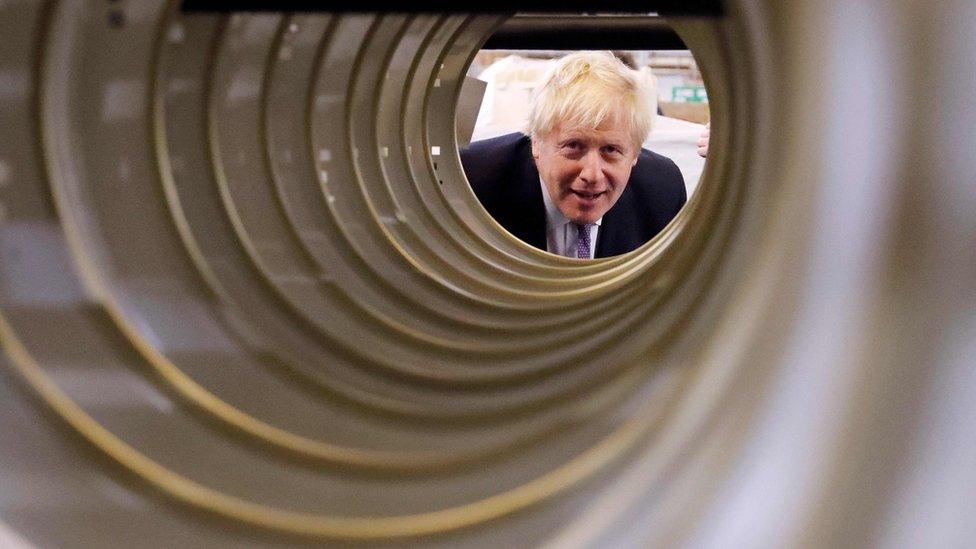
The Conservatives think they spy a path to victory
Conservative strategists will want to avoid any sense they are cantering towards a majority and Boris Johnson will keep talking up the chances of a Labour, SNP and Lib Dem alliance - a tactic that certainly hardened the Tory vote in 2015.
And while the polls show a Tory lead, external, it's impossible to know now how local factors, the ripples of Brexit, the fracturing of party ties and tactical voting will translate into seats won and lost. Many voters seem weary and uninspired by the choice in front of them. But at this stage, with the advantage seemingly theirs and Jeremy Corbyn a struggling foe, Conservative tactics are unlikely to change.
Labour: Change of tack

Labour has a problem.
If it is to repeat, never mind exceed, its 2017 performance it has to try to hold a volatile coalition of leave and remain voters together. But insiders say in the first half of the election campaign, the Lib Dem threat was over-estimated, while the willingness of Leave voters to switch from Labour to the Conservatives was under-estimated.
So in the next two weeks, if you live in a Leave area, you are likely to see a very different style of campaign.
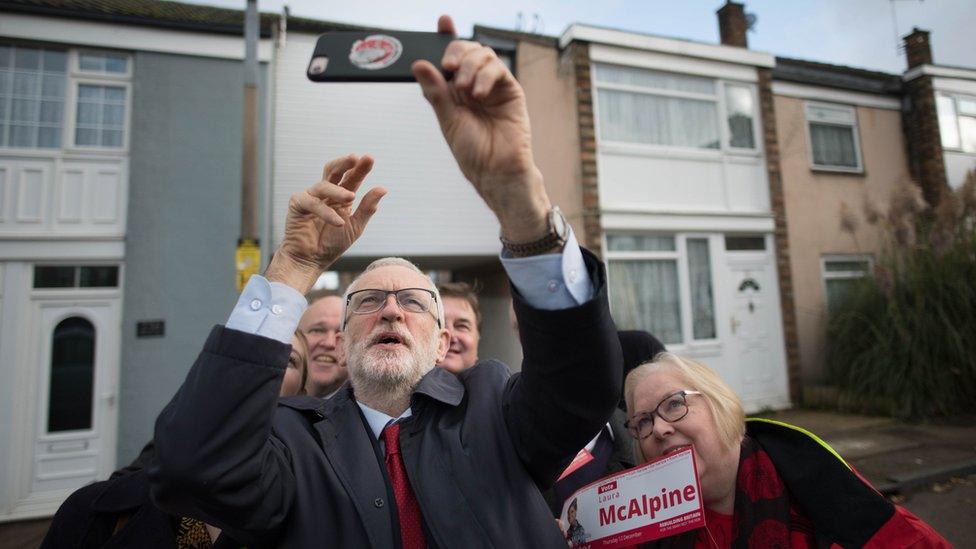
People living in Leave-voting seats like Harlow (pictured) may be seeing more of Jeremy Corbyn
Labour's new plan will give a higher profile to shadow cabinet members who back a Leave deal rather than Remain, with more activists set to be moved into Leave areas. The message will be that a new referendum won't be an attempt to remain in the EU by the back door, and that the option to leave will be a genuine choice.
(I'm told there will be new initiatives next week around US President Donald Trump's visit, aimed at raising concerns over any post-Brexit trade deal with the US.) And there will be a new emphasis on "bread-and-butter" issues which some strategists think have been under-played, from extending free bus fares to boosting police numbers.
Lib Dems: Relying on Remainers

The Liberal Democrats' election strategy is completely dependent on their anti-Brexit message chiming with voters who backed Remain at the EU referendum. But their promise to cancel Brexit without another vote, if they win the election, was controversial from the start. Even some Lib Dem candidates called it extreme.
Supporters insist that when the policy was announced back in September, it was an obvious next step, given the party's strong Remain position, after its forceful showing in the European elections.
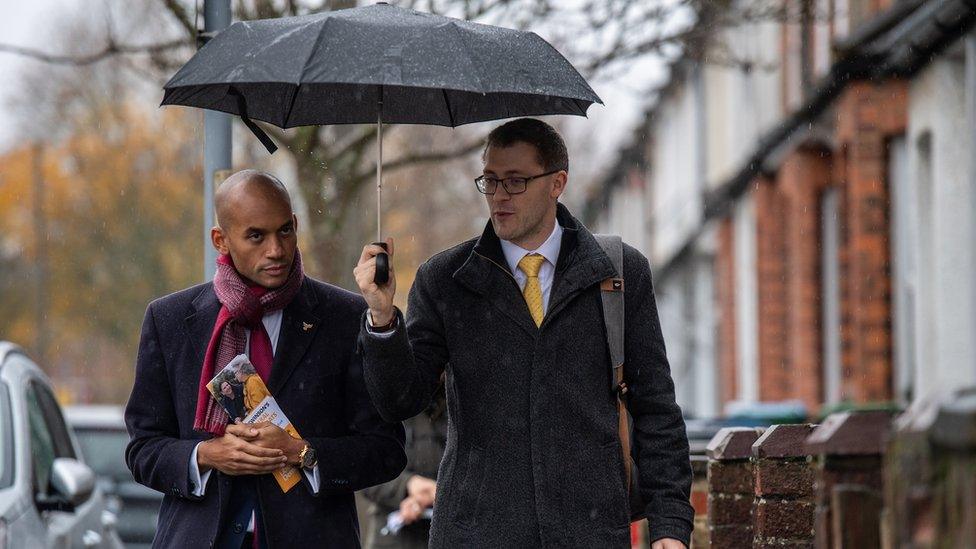
Chuka Umunna (left) is one of the high-profile Lib Dem candidates in London
But veterans of previous general election campaigns have always been more realistic. In reality, the intense ground operation is focused on about 40 constituencies.
With polls suggesting a slide in support since the campaign began, the message has subtly changed. Jo Swinson is no longer talking about becoming prime minister. Instead, she says it's all about taking seats off the Tories to stop Boris Johnson winning outright. If Jeremy Corbyn looks close to power as we head to polling day, wavering Conservatives may feel less inclined to lend their votes to the Lib Dems.
The Brexit Party's decision not to stand against sitting Conservative MPs has made the task harder because the pro-Leave vote could unite behind Boris Johnson in places like the South West, while the Remain vote is split with Labour.
Insiders insist the revoke policy isn't putting people off in the places the Lib Dems are genuinely contesting - in London and towns and cities that voted heavily to remain. Bluntly, they don't care what Leave voters think of Jo Swinson because that's not who they're trying to attract.
In some seats, they say they're detecting signs of huge by-election-style swings. That could lead to some spectacular turnarounds in individual seats with the party coming from third place to win.
Overall, experienced Lib Dem campaigners are expecting modest progress rather than a seismic breakthrough.
SNP: Scottish independence to the fore

The SNP started this election campaign in a strong position. They won more than half of the Westminster seats in Scotland in 2017 and are convinced they will increase that total this time. They are in second place in every Scottish constituency they don't hold. Their only problem is that they will probably again never reach the giddy total of 56 out of 59 seats they achieved in 2015, just months after losing the 2014 independence referendum.
Independence is front and centre again in this campaign. That is an easy sell for voters who are already convinced that Scotland should leave the UK. For those who aren't so sure, the SNP hope to win them over by making the case it should be for Scotland to decide its own future.
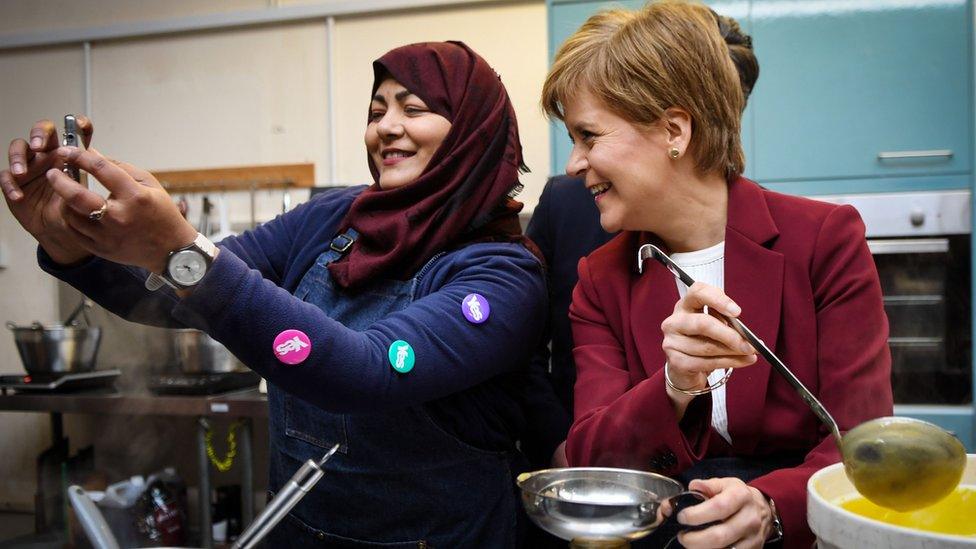
The SNP's main offering is a bid for another referendum on independence
The SNP also proudly proclaim they want to Stop Brexit (always with capital letters) - even though they could only do that by propping up a minority Labour government. That position could potentially deter the million or so Scots who voted to Leave. But the SNP hope many of them care more about Scotland becoming independent than about leaving the EU
This focus on constitutional issues creates a head-to-head clash with the Scottish Tories who want to leave the EU and stay in the UK. Labour, meanwhile, are being rather left out of the debate. The SNP hope to pick up all but one of the seven Labour seats in Scotland. They may find it harder to eject some of the 13 Scottish Conservatives.
Brexit Party: Looking to Labour Leavers

At the start of this campaign there was a significant buzz about the Brexit Party - an awareness that however they chose to approach the contest could have consequences in key battlegrounds in the Midlands and the north of England, not least for the Conservatives.
Since Nigel Farage decided to pull out of Tory seats, some of that noise has quietened. The recent launch of the party's policy platform - deliberately not described as a manifesto - was a muted affair compared with the early media events when journalists eagerly awaited detail of the party's strategy.
There's no doubt Mr Farage still commands a loyal following. Supporters applaud and cheer at his election rallies, convinced by both him and his version of Brexit. And he often proves popular, if divisive, on public walkabouts.
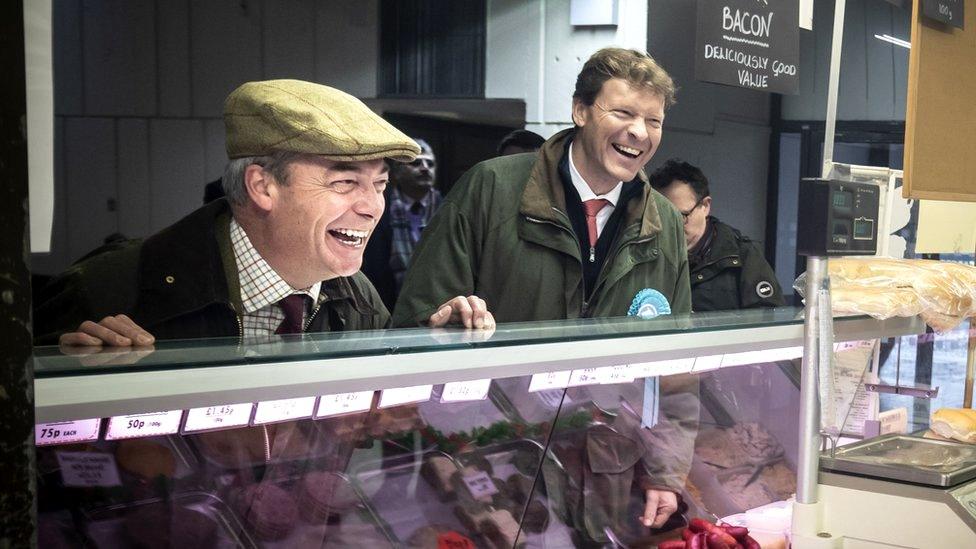
Nigel Farage (left) is a popular campaigner, but his Brexit Party is having to work harder to be heard
Pollsters and political rivals are still watching to see what impact the party might have on Leave voters in the Labour areas it's targeting. But in limiting where it's standing, there is a risk the party might have limited its own impact.
Internal disagreements over strategy seem, for now, to have calmed with candidates convinced of their crucial role in this contest. But faced with a Tory party making a lot of noise about Brexit, the Brexit Party is having to push harder to be heard.

CONFUSED? Our simple election guide, external
POLICY GUIDE: Who should I vote for?, external
POSTCODE SEARCH: Find your local candidates, external

- Published15 November 2019
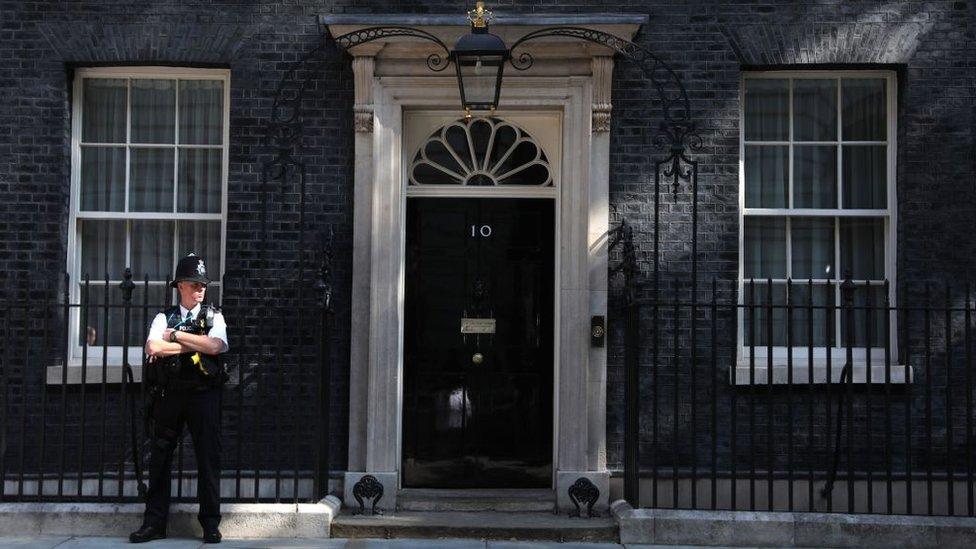
- Published11 December 2019
